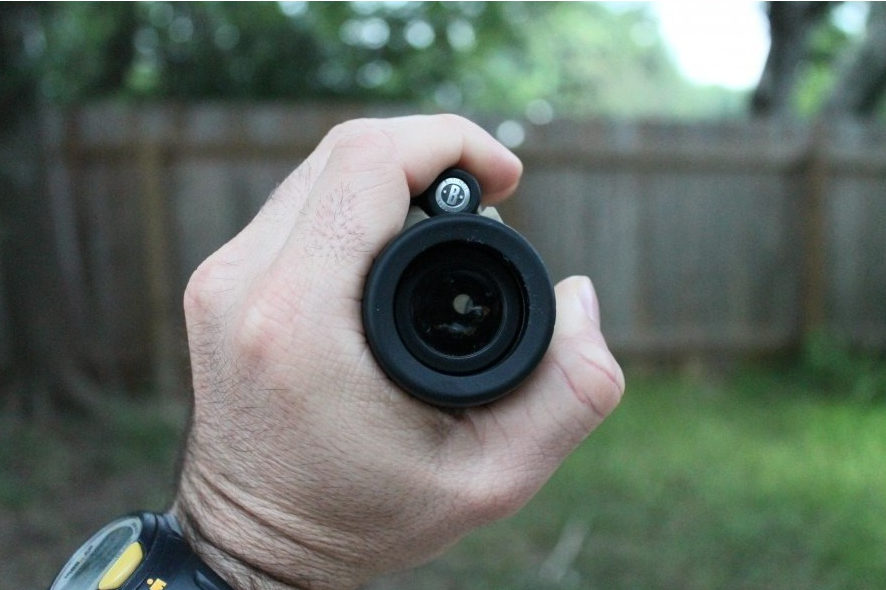A monocular should be used during any activity that requires long distance viewing and a compact device.
Some key hobbies that a monocular should be used for are hiking, camping, hunting, bird watching, wildlife viewing, astronomy, sporting events, theatre events, and art viewing. In addition, a monocular should be used as an alternative option for individuals who cannot use binoculars.
Let’s look at some key situations in which you should use one.
I’ll also tell you why you should use a monocular instead of other optics (ex. binoculars) in these situations.
Reason #1. Hiking and Camping
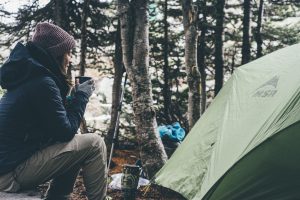
The correct time to use a monocular during a hike, as opposed to binoculars or a spotting scope, is when you need something lightweight and compact but you do not need flawless clarity or super long-distance range.
A really good monocular might be able to go up to 10x magnification, which is sufficient during a hike to scout potential routes (Target Tamer, 2019).
Monoculars can be useful to view what sort of terrain lies ahead and adjust your route accordingly. Let’s say you are on a hike with some entry level hikers. They may not feel comfortable with heavily rocked terrain, or too much incline or decline. You can look ahead with your monocular and find a route that will work for every individual on the hike and then store it neatly and easily in your pack or backpack.
Another proper time to utilize your monocular will be when scouting for your campsite.
Camping sites can range widely by difficulty level. In a situation where you are camping on established camp grounds, you will not have a need for you monocular (as far as scouting goes).
When you are camping out in the wild and scouting for a wild campsite, you might find a monocular very useful because you have to find ground that is level, clear, preferably in the shade, not at risk of flood, and the list goes on (Mom Goes Camping, 2019).
The last thing you need is to set up you camp site just to have to move again. You should use your monocular from a bird’s eye point of view to scout a wild campsite assessing a number of factors.
Reason #2. Hunting

The time to get out your monocular, as opposed to a different long-distance vision tool while hunting, is when your scouting a target and you need to quickly access your tool and put it away quickly.
For example, when you are bow hunting for deer, it might be most efficient to use a monocular because you could put it away quickly and take your shot when you need to.
While a monocular won’t have the range or clarity of binoculars or a spotting scope, you will be able to scout while holding you gun or bow.
A monocular can be used in big game or small game hunting. However, some hunting enthusiasts prefer to use a monocular more for big game hunting as opposed to the small game. The additional clarity of a spotting scope or binoculars can be helpful when scouting small targets such as rabbit, raccoon, opossum, grouse, armadillo, or squirrel. With big game, the monocular’s clarity will typically suffice.
An infrared or night vision monocular might be considered for real hunting enthusiasts. This link has some great options for night vision monocular’s if you are an avid hunter and are interested in different options; https://www.pointoptics.com/night-vision-monoculars/
Reason #3. Bird Watching and Wildlife Viewing
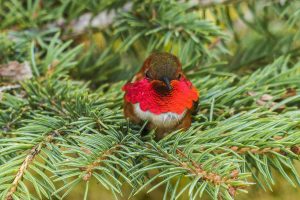
If you are thinking about taking up bird watching, using a monocular will make the hobby significantly easier.
Use the monocular for spotting by itself or as an easier-to-access supplemental tool with binoculars, or a spotting scope, for longer range.
Using your monocular for spotting while bird watching will allow you to carry more with you since it is so easy to store if you will be spending hours on your feet searching.
Consider bringing a camera and a recorder with you too so when you find the bird you are looking for you can record the experience.
Wildlife viewing is another instance where you should use a monocular for spotting.
Wildlife viewing enthusiasts look for a variety of different animals, really whatever suites them.
Similar to hunting, some wildlife viewers or bird watchers might prefer to use a different spotting instrument than a monocular, which is fine. Each individual has to find what works best for them and their hobby. A monocular is an excellent option for any activity that involves spotting or trail planning. (Target Tamer, 2019)
Reason #4. Astronomy

Stargazing enthusiasts have a number of magnifying instruments that might be used for their hobby.
Use a monocular as a supplemental tool with a larger telescope or all by itself, whatever you prefer and feel comfortable with.
Avid stargazers might point out that anything below thirty degrees is actually fairly easy to view with a monocular, however everything above thirty degrees might be easier to view with a telescope.
A monocular can be perfect for identifying your target in the night sky and then you can adjust a stronger tool, such as your telescope, to view it. Telescopes will typically be on a tripod, making them harder to adjust and harder to identify your target with.
A monocular should be seriously considered as an option for an astronomy enthusiast who wants to view larger night sky wonders such as the moon, planets, or even the moons of other planets.
Below is a list of our skies wonders that can be viewed with a monocular:
· The Milky Way
· Saturn
· Mars
· Lagoon Nebula
· The International Space Stations
· Multiple satellites
If you are interested in viewing any of these you can simple use a monocular to do so. (Our Top 10 Space Sites, 2016)
Reason #5. Sporting and Theatre Events
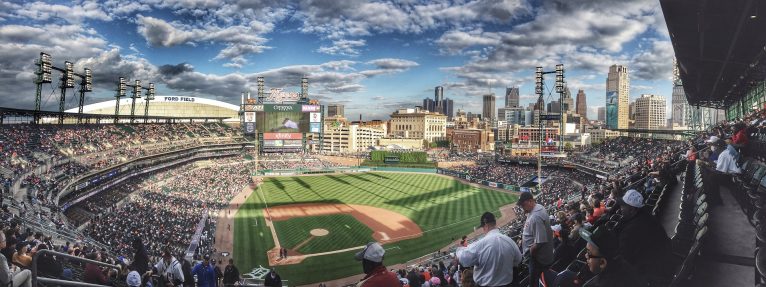
Use your monocular during sporting events to easily view the event at a distance.
Bringing a monocular with you to any sport event is super easy because they will typically fit in a purse or pocket.
You can use your monocular when it is convenient and then put it away when you don’t need it.
Let’s say you score tickets to the Super Bowl, but your seats are, of course, in the nosebleed section. Bring a monocular with you to watch the event from a distance and you will still be able to see the action, making the event more enjoyable and easier to follow.
A monocular should also be used at theatre events, including plays, concerts, the opera, and much more.
If you are seated in the back you can use your easy-to-store monocular to view the event.
So overall, monoculars are great to use when you are seated at an uncomfortably long distance away from the action you want to see.
Reason #6. Vision Problems and Headaches
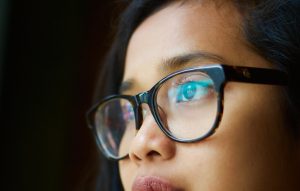
If one of your eyes is worse than the other, a monocular can benefit you in many situations.
A monocular can make it possible for you to participate in activities that require long distance viewing, even with your impairment.
A monocular also makes it possible for individuals who are susceptible to headaches to still partake in activities that require long-distance viewing.
Some people cannot use binoculars because of the pressure it puts between their eyes.
Occasionally they can readjust their binoculars to solve the problem, but sometimes the only option for them is to use a monocular.
Reason #7. Art Viewing

Use a monocular at art exhibits, museums, galleries, etc. to get an up-close look.
A monocular is perfect, again, for this scenario because it can easily fit in a pocket or purse.
Simply whip out your monocular to get a better look at the color, texture, and detail of the art.
A monocular can make art viewing a totally different experience for an enthusiast.
Monoculars are even frequently used by art collectors, gallery owners, along with a number of other careers in the art community.
Although binoculars are pretty portable, a monocular is much more portable, which means, for art viewing, a monocular is the better tool to use.
Conclusion
Hopefully this article will help you determine when to bring your monocular with you and when you can get by with leaving it at home.
Check out our Monocular Review subcategory to see which monoculars we recommend you buy.
Sources
1. Mom Goes Camping. (2018). How to Scout Out a Wild Camping Spot Before Your Trip. [online] Available at: http://momgoescamping.com/choose-camping-spot/ [Accessed 22 Nov. 2018].
2. Our top 10 space sights you can see with just binoculars. (2016, April 06). Retrieved from https://www.gadgette.com/2016/04/06/our-top-10-night-sky-objects-you-can-see-with-just-binoculars/
3. Point Optics. (2018). The 10 Best Night Vision Monoculars 2018. [online] Available at: https://www.pointoptics.com/night-vision-monoculars/ [Accessed 22 Nov. 2018].
4. Target Tamers. (2018). Monocular VS Binocular for Birding, Hunting, Astronomy, Safari & More. [online] Available at: https://www.targettamers.com/guides/monocular-vs-binocular/ [Accessed 22 Nov. 2018]

About The Author:
Hi! I’m Will Scott, the author of this post. I’m an outdoor enthusiast with over 10 years experience. I love trying out new gear and reviewing it so that other adventurers can get the most out of their experiences. I hope you’ve found my website informative, educational and helpful.

